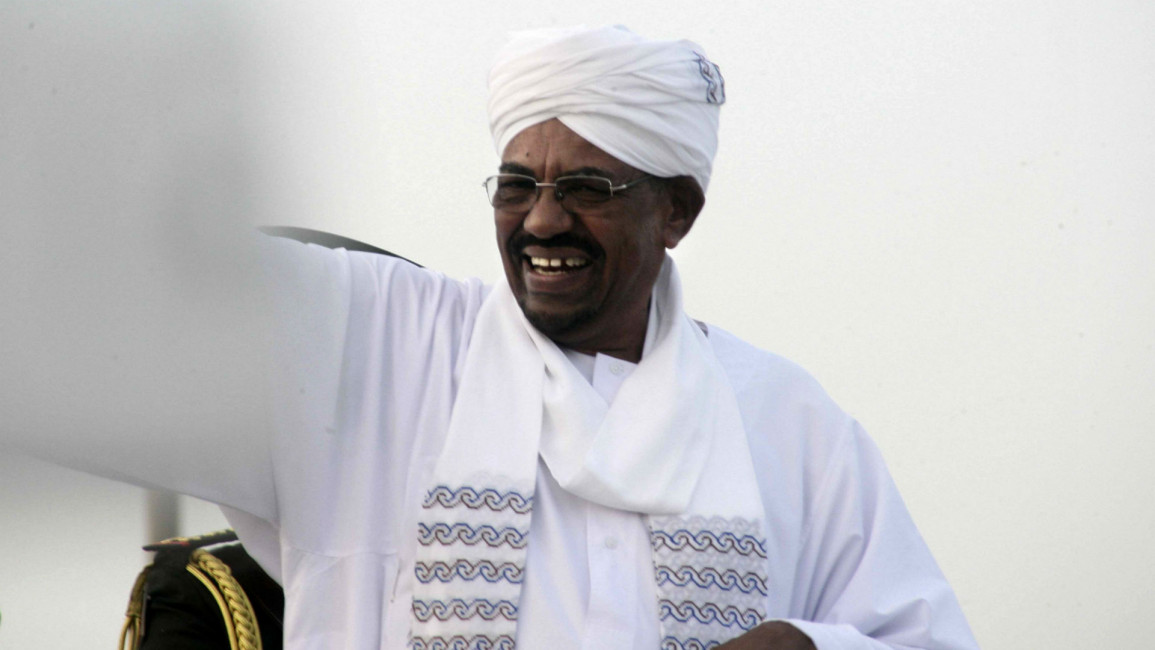South Africa may quit ICC over Sudan president’s debacle
South Africa may quit ICC over Sudan president’s debacle
The South African government has threatened to quit International Criminal Court, amid controversy over Pretoria's refusal to enforce an ICC arrest warrant against visiting Sudanese president.
3 min read
Bashir arrived back in Khartoum after leaving South Africa on 15 June [Getty]
South Africa announced Thursday it may withdraw from the International Criminal Court after an outcry over the government's refusal to arrest Sudanese President Omar al-Bashir on genocide charges.
"South Africa may as a last resort also consider withdrawing from the ICC. Such a decision will only be taken when South Africa has exhausted all remedies available to it in terms of the Rome Statute," Minister in the Presidency Jeff Radebe told reporters.
On Wednesday, a South African court urged prosecutors to consider criminal charges over the government's failure to prevent Bashir from leaving the country in defiance of a court order.
No immunity
Bashir, who is wanted by the International Criminal Court on genocide charges, flew out of Pretoria last week after attending a meeting of the African Union despite a judge's ruling barring his departure.
Judge Dunstan Mlambo said in the Pretoria High Court that if the government ignored the principles of the rule of law and its constitutional obligations, democracy would collapse.
The government has argued that because Bashir was attending a summit of the African Union he had immunity from arrest.
But the judge, presenting reasons for the court's order barring Bashir's departure, disagreed.
"The Rome Statute (of the ICC) expressly provides that heads of states do not enjoy immunity under its terms," he said.
South Africa was consequently under an obligation to arrest Bashir and surrender him to the court, he said.
The court "invite(s) the national director of prosecutions to consider whether criminal proceedings are appropriate", he said.
The government has until Thursday to explain why Bashir was allowed to leave, a move that sparked international condemnation by rights groups and governments including the US.
Is the ICC biased?
However, many members of the AU have accused the ICC of targeting only African leaders, and point out that the US and other major powers such as Russia and China have refused to place themselves under The Hague-based ICC's jurisdiction.
The domestic constitutional tussle could have international repercussions, as could the government’s threat to withdraw from the ICC unless it agrees to reforms.
The South African Litigation Centre, which sought the court order for Bashir's arrest, welcomed Wednesday's judgement.
"We are very happy with the court's judgment. It is a very solid judgment that speaks profoundly to the rule of law," said the centre's Angela Mudukuti.
Depending on what the government's affidavit contained, the organisation would decide on what further steps to take, she said.
Bashir has evaded justice since his indictment in 2009 for alleged serious abuses in the western Sudanese region of Darfur.
"South Africa may as a last resort also consider withdrawing from the ICC. Such a decision will only be taken when South Africa has exhausted all remedies available to it in terms of the Rome Statute," Minister in the Presidency Jeff Radebe told reporters.
On Wednesday, a South African court urged prosecutors to consider criminal charges over the government's failure to prevent Bashir from leaving the country in defiance of a court order.
No immunity
Bashir, who is wanted by the International Criminal Court on genocide charges, flew out of Pretoria last week after attending a meeting of the African Union despite a judge's ruling barring his departure.
Judge Dunstan Mlambo said in the Pretoria High Court that if the government ignored the principles of the rule of law and its constitutional obligations, democracy would collapse.
| The Rome Statute (of the ICC) expressly provides that heads of states do not enjoy immunity under its terms. -Judge Dunstan Mlambo. |
But the judge, presenting reasons for the court's order barring Bashir's departure, disagreed.
"The Rome Statute (of the ICC) expressly provides that heads of states do not enjoy immunity under its terms," he said.
South Africa was consequently under an obligation to arrest Bashir and surrender him to the court, he said.
The court "invite(s) the national director of prosecutions to consider whether criminal proceedings are appropriate", he said.
The government has until Thursday to explain why Bashir was allowed to leave, a move that sparked international condemnation by rights groups and governments including the US.
Is the ICC biased?
However, many members of the AU have accused the ICC of targeting only African leaders, and point out that the US and other major powers such as Russia and China have refused to place themselves under The Hague-based ICC's jurisdiction.
The domestic constitutional tussle could have international repercussions, as could the government’s threat to withdraw from the ICC unless it agrees to reforms.
The South African Litigation Centre, which sought the court order for Bashir's arrest, welcomed Wednesday's judgement.
"We are very happy with the court's judgment. It is a very solid judgment that speaks profoundly to the rule of law," said the centre's Angela Mudukuti.
Depending on what the government's affidavit contained, the organisation would decide on what further steps to take, she said.
Bashir has evaded justice since his indictment in 2009 for alleged serious abuses in the western Sudanese region of Darfur.



